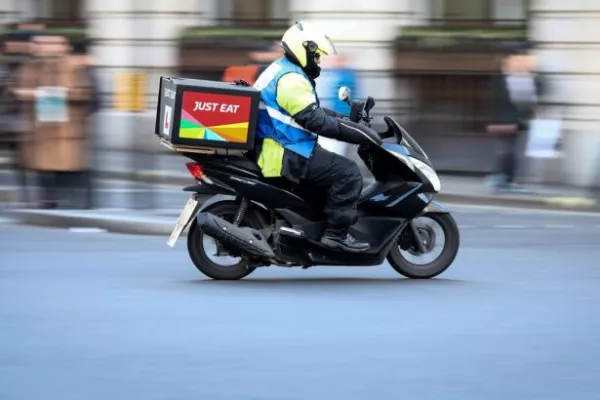Just Eat is having its curry and eating it. The UK-based takeout app is poised to enter the FTSE 100 index after a 40 percent run-up in its shares over a year.
The company has confounded its early skeptics by lifting sales and, most importantly, profit in the near four years since it went public. Unlike online electrical retailer AO World, which came to market at a similar time, it generates free cash.
At a lofty valuation - Just Eat trades on 36 times forward earnings, although that's a discount to US peer GrubHub - the risks should be on the downside.
There's competition from Deliveroo, Amazon.com and Uber Eats, all fighting over a British consumer who's feeling less and less chipper. And look at what's happening in the restaurant market, particularly mid-market casual dining chains. Sales are flat-lining across an industry that's expanded aggressively.
What's more, Just Eat's margins are surprisingly tasty for an online food business. Ebitda is forecast to be 31 per cent of sales in the year to 31 December 2017, way above the six per cent or so at online supermarket Ocado.
While fat margins are always welcome, they won't have escaped the attention of restaurant owners who'd like to whittle down Just Eat's 13 per cent commission. The famously asset-light company is experimenting too with managing actual deliveries for some branded restaurants, something it has shunned before. And, of course, to keep its brand uppermost in the minds of fickle app users, it'll have to keep splurging on technology and marketing costs. That could all pressure margins.
But, Just Eat has one crucial defence. As I've argued elsewhere, when the consumer's under pressure - as they are now with inflation outpacing wages and with higher interest rates looming - they look first for value for money.
As such, the likes of Greggs with its sausage rolls, Primark with its cut-price fashion and JD Wetherspoon, a paradise pub chain for skint drinkers, have all been performing very nicely as shoppers tighten purse strings. That's reflected in their share prices.
Just Eat has a similar market position, unlike its slightly more bourgeois competitor Deliveroo and arguably Amazon. UberEATS may be more of a direct threat, especially after a tie-up with McDonalds - the type of fast-food chain with which Just Eat is keen to do business.
So while you might imagine cash-strapped punters cutting down from two takeaways a week to one, it's not a certainty if you're already talking about food that's pretty inexpensive. Deutsche Bank analysts estimate that the average Just Eat order in the U.K. this year is 20 pounds, compared to nearer 30 pounds for Deliveroo. With such a low outlay, Brits might hang on to their beloved takeaways or even trade down from a night out at a casual restaurant or pub to a meal in front of the telly.
Just Eat's valuation is far from cheap. But the food it offers is, and that just might be its saving grace.
This column does not necessarily reflect the opinion of Bloomberg LP and its owners
News by Bloomberg - edited by Hospitality Ireland









